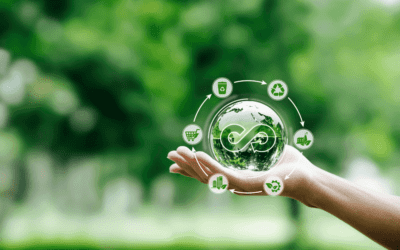Waste isn’t just about what’s ‘left over’ when we’ve finished with food, electronics, consumer goods and other items. It’s about the whole process – from the quantity of water and the acreage of forests felled for production to the amount of recycled material used in new products and the awareness people have of what it takes to create their everyday lives.
That’s why waste matters, and it’s why we speak regularly about this issue. Earlier this year, we wrote a blog discussing why waste should be higher up the climate agenda. And now, as COP27 is well underway in Egypt, we want to continue that conversation.
Waste matters
WRAP, a climate action NGO working in 40 countries around the world, found that of the 193 countries submitting their Nationally Determined Contributions at COP27, only nine committed to reducing food waste, for example. And yet the IPCC estimates that food systems contribute up to 37% of global greenhouse gas emissions.
Similarly, the International Solid Waste Association claims that transitioning to a circular economy, we where reclaim, reuse and recycle as much waste material as possible, could mitigate up to 20% of global greenhouse gas emissions. At last year’s COP26 in Glasgow, waste wasn’t even on the agenda – something that was commented on at the time by the President of the Chartered Institution of Wastes Management, Dr Adam Read. He pointed out that there is clear evidence that good waste management can make a significant difference, and that it should be fully recognised as a fundamental part of tackling the climate emergency.
What’s happening at COP27?
This year, there are some waste-related events happening. These include a panel on ‘Waste diversion and segregation: A huge opportunity for methane mitigation and a challenge for ambitious public policy and subnational implementation.’ This event is within the official conference venue, with speakers including Rodolfo Lacy, OECD Director for Climate Action and Environment for Latin America and Special Envoy on Climate Matters to the UN. The session will look at the relevance of public policy on waste diversion and segregation for the global south.
And groups are hoping to raise awareness of waste issues as the conference progresses. For example, Australian start-up Zero Co launched its ‘100 Yr Cleanup’ campaign by building a huge pyramid made entirely of single use plastics collected from the River Nile. The company’s founder has been camping out on top of the pyramid, and the campaign aims to raise money from COP27 attendees individually and corporately, by encouraging them to sponsor bundles of rubbish. It hopes to raise $1m over the coming year and remove the equivalent of 15 million water bottles in plastic waste around the globe.
Waste needs a bigger focus
All of these initiatives show that various people and organisations are invested in waste management. But in order to make a significant difference countries need to agree to both tackle current poor waste management practices in many parts of the world, and to improve those practices even where they are relatively mature.
Waste still does not feature as a standalone UN Climate Change topic and so does not attract the level of debate and action that we feel is necessary in order to proactively and seriously address the contribution that poor waste management makes to climate change. Alongside other waste management organisations, we are keen for this to change – we cannot afford to ignore the impact that waste has, and we will continue to develop solutions that help waste management and recycling companies to reduce landfill, adopt the circular economy model and make a measurable difference. We remain committed to providing the worlds most advanced waste management software.





